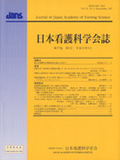Japanese
English
- 販売していません
- Abstract 文献概要
- 参考文献 Reference
要旨
【目的】「神経難病患者の療養生活対処尺度」を開発し,その信頼性と妥当性を検証することを目的とした.本研究では「対処」とは,意図的な努力であり,対象者がおかれた状況を改善したり,問題を解決するために,認知の仕方や行動を変化させる取り組みまたは努力のプロセスとして定義した.
【方法】インタビューに基づいて25項目5件法の質問紙を作成・郵送し,難病患者243名から有効回答が得られた.統計的に不適切な項目を除外し,因子分析を行った.
【結果】因子分析の結果,最終的に15項目4因子が精選され「心情整理」「自立維持」「交流維持」「自己開示」と命名された.信頼性についてはCronbach's α係数(0.86)と折半法のSpearman-Brownの信頼性係数(0.81)によって確認した.また妥当性についてはコーピング尺度と難病患者に共通の主観的QOL尺度によって確認された.
【結論】以上の結果から,本尺度の信頼性と妥当性が概ね確保されており,実用可能な尺度であると判断した.
Abstract
This research aims to develop a coping scale for patients with intractable neurological diseases and to examine the reliability and effectiveness of that scale. In this study, “coping” is defined as deliberate efforts to change one's cognition or behavior toward improving one's situation or solving one's problems. Based on interviews, a questionnaire of 25 items with 5 choices of answers for each question was drafted, and valid responses were received from 243 patients with intractable neurological diseases. Statistically inappropriate items were eliminated, and factor analysis was conducted. Consequently, 15 items comprising 4 factors were selected: “sorting out of feelings,” “maintenance of independence,” “maintenance of interpersonal relations” and “self-disclosure.” Reliability was confirmed using Cronbach's α coefficient (0.86) and Spearman-Brown's coefficient of reliability (0.81). The results were compared to those obtained using Ozeki's coping scale and Kawaminami's scale for subjective QOL common to patients with intractable diseases. The new scale was found to be reliable, effectiveness, and practicable.
Copyright © 2007, Japan Academy of Nursing Science. All rights reserved.


